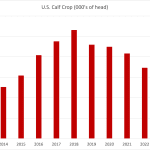By Phil Franz-Warkentin
Glacier FarmMedia MarketsFarm – The ICE Futures canola market was weaker on Monday, as bearish chart signals and losses in the Chicago soy complex weighed on values.
Speculative fund traders were thought to be back adding to their short positions, with nearby technical charts pointing lower. However, the November contract managed to uncover support and finished off its lows for the day.
Relatively favourable North American weather forecasts were also bearish, with cooler Prairie conditions expected in the latter half of August.
Read Also
Canadian Financial Close: Loonie weakens
By Glen Hallick Glacier Farm Media | MarketsFarm – The Canadian dollar pulled back on Monday, due to a lack…
There were an estimated 56,957 contracts traded on Monday, which compares with Friday when 56,595 contracts traded. Spreading accounted for 23,762 of the contracts traded.
SOYBEAN futures at the Chicago Board of Trade were lower on Monday, pressured by relatively favourable weather forecasts, with welcome rains and more moderate temperatures expected in key United States growing regions over the next week.
A ruling from the U.S. Appeals Court last week rejecting a decision by the Environmental Protections Agency to deny waivers from biofuel blending rules to smaller oil refiners was viewed as negative for soyoil demand and continued to weigh on prices on Monday.
A lack of major export demand, along with the fact U.S. farmers are still holding large old crop supplies, contributed to the declines.
The U.S. Department of Agriculture reported weekly U.S. soybean export shipments of 403,000 tonnes, which was up 20 per cent from the previous week. However, crop year-to-date movement of 42.8 million tonnes is down 15.3 per cent on the year.
CORN was also pressured by the good U.S. weather but managed to recover from earlier losses as advances in wheat provided support.
Weekly U.S. corn export inspections of 1.06 million tonnes were up seven per cent from the previous week, with year-to-date movement of 46.7 million tonnes up 34 per cent on the year.
WHEAT was underpinned by production concerns in Europe and the Black Sea region, as prices corrected off multi year lows.
French soft wheat crop ratings fell to their lowest level for this time of year in eight years, with only about half of the crop reportedly in good-to-excellent condition.
Weekly U.S. wheat export sales were strong, up 64 per cent on the week at 431,000 tonnes.








